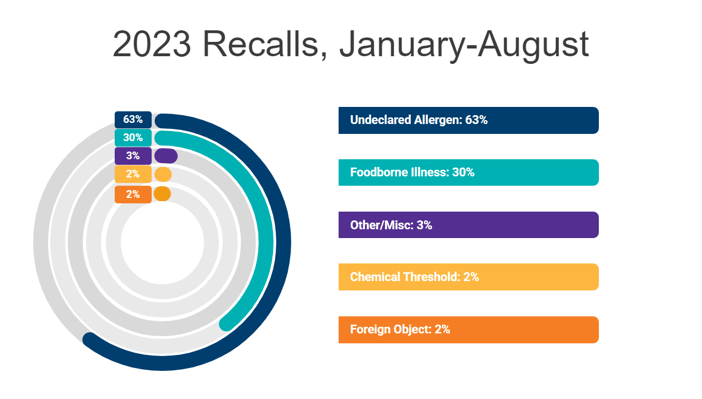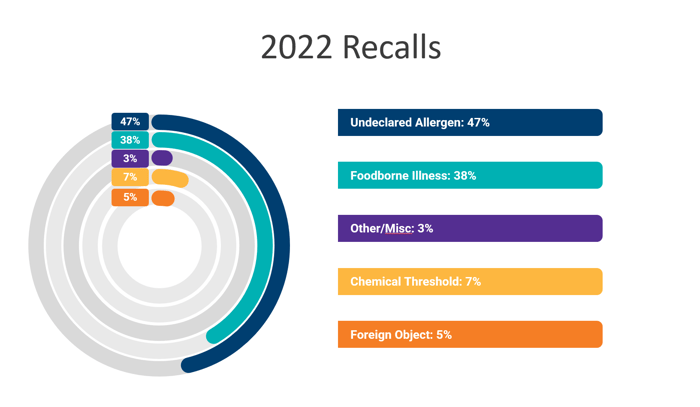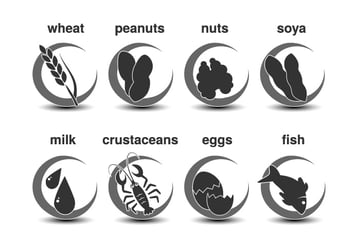Recalls can be caused for a number of reasons, and for many recalls that are newsworthy, foodborne illness outbreaks are often at the heart of the issue. But hundreds of recalls happen every year – a number that is growing as technology improves to catch these issues early – and many of those recalls never make headlines.
In fact, Trustwell performed a short independent audit of FDA Class I Recalls posted on their Recalls, Market Withdrawals, and Safety Audits website in both 2022 and 2023 (January-August). Can you guess what the leading cause of recalls was? Surprisingly, Undeclared Allergens made up the largest percentage of recalls overall, making up 47% of all recalls in 2022 and 63% of recalls in 2023, so far.


While these types of recalls may be less publicized than those involving foodborne illness, the repercussions and cost of the recall can still be just as devastating. For consumers with serious food allergies, unintentionally ingesting an allergen can lead to serious illness or death. For food companies, recalls of any type can cost companies upwards of $10 million or more in lost inventory, non-compliance fees, legal fees, and more.
Why Undeclared Allergens Cause So Many Recalls
The FDA considers food allergens to be a major food hazard, which is why they have implemented strict guidelines on how to label and properly declare allergens on a product label. For U.S. consumers with a food allergy, even a minor presence of an allergen can lead to serious illness, anaphylactic shock, or death. According to the FDA, any presence of an allergen, including protein derived from allergens (for example, sodium caseinate derived from milk), must be declared clearly on product labels.
As of 2023, there are 9 allergens that food companies must declare on a food or supplement product label intended for U.S. consumers: milk, eggs, fish, shellfish, tree nuts, peanuts, wheat, soybeans, and sesame.
Sesame was the latest allergen to be added to the list – companies had two years to comply by January 2023 – which could be one reason why undeclared allergen recalls are on the rise this year. However, it is also likely that packaging errors due to supply chain shifts and shortages, which have been common over the past few years, are leading to some manufacturers not accurately documenting when supplier ingredients have been updated.
The number of recalls due to undeclared allergens have been high for several years, as the FDA’s allergen regulations are strict. Companies that miss an allergen ingredient, or improperly format a declaration will likely see a recall down the line.
Allergen Labeling Mishaps
The FDA’s guidelines on labeling allergens are clear: any presence of an allergen in a food or ingredient must be declared on a label. However, the FDA provides little guidance on precautionary allergen labeling. Some companies may find confusion here, as including a voluntary allergen statement such as “produced in a facility with (allergen)” is optional and not required by FALCPA regulations. However, the FDA is clear on one thing: voluntary statements should not be used in replacement of implementing good manufacturing practices.

As companies have adjusted to the sesame allergen labeling requirement, the FDA has also had to make a statement about a new issue. NPR recently highlighted that consumers with sesame allergens are finding it more difficult to avoid sesame, despite the allergen law. NPR shared: “This is due to an unintended consequence that neither regulators nor people with a sesame allergy saw coming: Big commercial bakers began adding sesame, often in the form of sesame flour, to products that had never contained it before.” NPR notes this is likely due to commercial bakers opting to not establish a separate, sesame-free production line, but to instead comply with the regulation without investing in a more costly option.
But the FDA discourages this move. FDA Commissioner Dr. Califf recently shared this statement in an FDA update:
“We have become aware of a practice with an outcome we do not support. Some manufacturers are intentionally adding sesame to products that previously did not contain sesame and are labeling the products to indicate its presence. This keeps manufacturers in compliance with our law for disclosing the presence of a major food allergen, but limits options for consumers who are allergic to sesame.
“With the passage of the FASTER Act, the FDA and families with sesame-allergic members hoped that it would become easier for those allergic to sesame to feel more confident in their food choices with the clear label declaration of sesame as a major food allergen. I don’t think anyone envisioned there being a decrease in the availability of products that are safe choices for sesame allergic consumers.”
You can hear more about this topic in our recent Transparency Talk podcast episode covering the latest regulations in the industry.
Avoid Undeclared Allergens with Training and Tech-Enabled Solutions
Knowledge is often the best remedy for avoiding undeclared allergens, and tech with built-in checks and balances can help your company perform due diligence when ensuring compliance.
Be sure to educate employees – everyone from formulators and label makers to those working along your supply chain – about the importance of accurately declaring allergens on food product labels and avoiding cross-contact. Regularly communicating allergen standards with suppliers can also help your partners down the line maintain compliance with your food safety standards.
You can also take employee training a step further with Trustwell’s on-demand Allergen Statement Regulatory Seminar. In the seminar, Trustwell’s team of experienced compliance specialists will cover the finer details of allergen labeling regulations, so your employees will have the knowledge and tools needed to protect your consumers’ health. Whether your business is in manufacturing, retail, distribution, or foodservice, this seminar can benefit your team.
Key topics include:
- The most current allergen regulations for U.S. product labeling
- Overview of allergen regulations in Canada, Mexico, and the European Union
- Tips on handling cross-contamination issues
- Implementing effective allergen control measures
- Best practices for allergen declarations on labels
- Navigating potential legal and financial consequences of non-compliance
- And more
Purchase the on-demand seminar today:
Navigating the Allergen Labeling Maze: A Comprehensive Seminar on Allergen Labeling Regulations
Now Available On-Demand
At Trustwell, we understand the importance of clear and accurate product labeling. Our Genesis labeling suite offers features like automated allergen declaration checks to help you maintain compliance with allergen labeling and not miss an essential declaration.
Plus, our FoodLogiQ suite helps companies streamline communication across their supply chain, to help you better manage and monitor supplier compliance, essential communication, and documentation.
To learn more about our suite of solutions and how Trustwell can help your company avoid allergen noncompliance, connect with our team today.
Tag(s):
Food Labeling
,
Food Industry
,
Supplier Compliance
,
Recall
,
Industry Regulations
,
Food Recalls
,
Trends
Other posts you might be interested in
View All Posts
Food Labeling
2 min read
| April 23, 2021
Sesame Added As the 9th Major U.S. Food Allergen
Read More
Food Labeling
18 min read
| October 8, 2021
How to Declare Sesame as an Allergen in Genesis R&D Foods
Read More
Supplier Compliance
6 min read
| February 12, 2019

